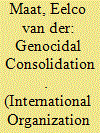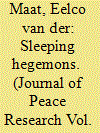|
|
|
Sort Order |
|
|
|
Items / Page
|
|
|
|
|
|
|
| Srl | Item |
| 1 |
ID:
175816


|
|
|
|
|
| Summary/Abstract |
Under conditions of guerrilla conflict, mass indiscriminate violence has been shown to effectively starve a guerrilla of its support. Consequently, counter-guerrilla mass violence is concentrated within territories where a guerrilla is dominant. However, in roughly 40 percent of mass violence episodes (e.g., Rwanda and Cambodia), the violence was aimed at populations within areas of secure territorial control. These episodes have therefore been explained by attributing ideological preferences to leaders or as unique cases only. I argue that leaders adopt mass indiscriminate violence against outgroups to consolidate power under conditions of elite rivalry. The violence serves two main goals. First, it helps build coalitions with constituencies that gain from violence; and second, it targets rival factions indirectly by forcing local security officials to facilitate or oppose the violence. The violence thereby provides rival supporters with an exit option, provides the regime with information on rival supporters’ private loyalties, and undermines rivals’ abilities to mount an effective resistance. These rivals can ultimately be purged from the regime. Based on newly collected original data on elite purges and on the type of mass indiscriminate violence for the years 1950 to 2004, I show that this type of mass violence, which I call “genocidal consolidation,” is intimately connected to authoritarian consolidation.
|
|
|
|
|
|
|
|
|
|
|
|
|
|
|
|
| 2 |
ID:
103718


|
|
|
|
|
| Publication |
2011.
|
| Summary/Abstract |
It is not clear why some territorial transgressions lead to intervention by the international community and others do not. As most territorial transgressions lead to a reaction from the international community but a few, however, do not, this study examines the main determinants for non-intervention by capable members of the international community, following violation of the territorial integrity norm by a deviant state. This article focuses on which characteristics of the norm-transgressing state, the conflict, and the state capable of enforcing the norm affect the occurrence of non-intervention. This comparative study examines six major alleged transgressions of the territorial integrity norm - the occupation of Tibet, the Suez crisis, the 1967 six-day war, the Indonesian occupation of East Timor, the Moroccan occupation of the Western Sahara, and the 1989 Gulf crisis - using a multi-methodological approach based on qualitative methods, most notably fuzzy-set Qualitative Comparative Analysis. Analysis reveals that the absence of high security costs to the hegemon in combination with (a) strategically important security relations between the transgressor and the hegemon or (b) absence of military and economic vulnerability are generally necessary and sufficient for non-intervention.
|
|
|
|
|
|
|
|
|
|
|
|
|
|
|
|
|
|
|
|
|